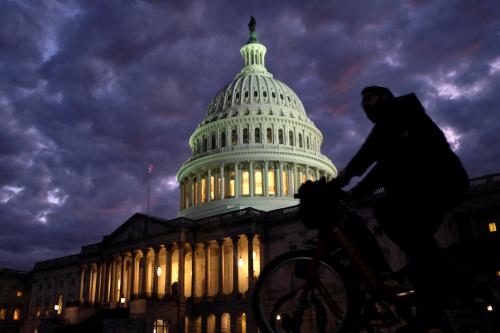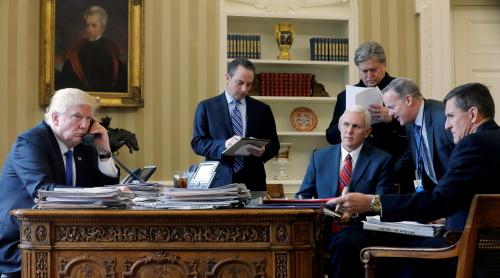As we come to the end of the second week in the impeachment saga of President Donald Trump, the air is filled with more questions than answers. A preliminary list:
- Should the Democrats proceed quickly to write articles of impeachment on what is already known or should they continue investigating?
- Which of the many accusations against the president make the strongest grounds for impeachment?
- Will public opinion move enough to cause some Republican Senators to abandon Trump?
- What will happen in the election of 2020 and beyond as a result of all this?
- Is Donald Trump simply saying what comes into his head or does he have a political strategy?
It’s too early to have definitive answers to any of these questions but a little bit of history should help us think about these questions. So here goes.
Should Congress move quickly or get more evidence?
House investigations into various aspects of the Trump presidency began in 2019 as soon as Democrats took control of the House. However, by the time Speaker Pelosi changed her mind and called for an impeachment inquiry, the House had already encountered refusals to turn over documents and to have administration officials testify. Thus, one option open to the Speaker is to proceed without more investigations using just what’s in the Mueller Report and the Ukraine phone call as evidence. In the 1998 impeachment of President Clinton, the Republicans controlling the House did just that. The Independent Counsel’s report contained detailed evidence of Clinton’s affair with an intern. The rest went relatively quickly, the House began impeachment proceedings on October 8, 1998, approving articles of impeachment on December 19, 1998. The Senate acquitted Clinton on February 12, 1999. Arguing against moving quickly is the fact that by the end of the week a second whistleblower seemed to be able to provide more evidence in support of the first whisteblower. The temptation is great to hope that more evidence might convince more Republican Senators to vote against Trump.
What’s the strongest argument for impeachment?
In every prior impeachment trial, members of the House of Representatives have had to choose which articles of impeachment should be brought up for a vote. If they pass the House, these are sent on to the Senate. In the very first presidential impeachment case, that of President Andrew Johnson, 11 articles of impeachment were passed. Most of them dealt with an obscure law called the Tenure of Office Act but the tenth and eleventh dealt with the way Johnson treated Congress. Although all 11 went to the Senate the president’s opponents in the Senate maneuvered to allow votes on only three of the articles, judging that these three (two on the Tenure of Office Act and one on his treatment of Congress) would stand the greatest chance of conviction. They were almost right; the fight to convict Johnson lost by one vote. In the Nixon impeachment five articles were drafted. Three passed in committee: obstruction of justice, abuse of power and contempt of Congress. But two were rejected: one for concealing records on the secret bombing of Cambodia and another on Nixon’s personal taxes. Susan Hennessey, Quinta Jurecic and Benjamin Wittes, writing in Lawfare, make a good case against throwing everything but the kitchen sink into the Trump impeachment and history supports them.
What’s the role of public opinion?
Trump clearly wants to keep a firm base of support, one that is strong enough to scare Republican senators into sticking with him lest they get themselves a strong primary opponent. Richard Nixon won a landslide victory in 1972 and had very high approval ratings in his first term. In 1973 his approval hit 67 percent, an all-time high for him (and a very high rating for any modern president). But the Watergate Hearings began that spring and took a steady toll on his presidency. By the beginning of 1974 Nixon was down to his unshakeable base which was only about 25 percent.
In contrast, Bill Clinton’s approval ratings averaged 60 percent in his second term, the term in which he was impeached. In fact, in late 1998 when the House approved two articles of impeachment against him, Clinton’s approval rating jumped to 73 percent—his highest ever—and a large majority told pollsters they wanted Clinton to stay in office.
Obviously, the public forms an opinion over time as to the seriousness of the charges, and they will do so again. As William A. Galston writes, there is movement in favor of impeachment but so far it seems to have come from Democrats solidifying their opposition to Trump. Trump’s approval ratings have been historic because they have been consistently under 50% since he was inaugurated. He does not have far to go to get to Richard Nixon’s 25% and his base appears to be especially ardent.
What is the political legacy of an impeachment?
Partisans on both sides will, no doubt, make existential predictions for the demise of the party impeached. But history tells a far more nuanced story.
Andrew Johnson was a Democrat turned Republican who earned a spot on Abraham Lincoln’s ticket as vice president. When Lincoln was assassinated he became an accidental Republican president impeached by fellow Republicans. The backdrop of the Johnson impeachment was the issues around reconstruction after the Civil War. These included whether to give freed slaves voting rights, whether or not to pardon the southerners who lead the rebellion, and how and under what circumstances the southern states would be readmitted to the Union. All of this is explored in a riveting book by Brenda Wineapple called The Impeachers.
Johnson earned the enmity of many in his party by siding with Democrats and the South on these issues and narrowly escaping impeachment. When he sought reelection, winning the Republican nomination was out of the question but he expected to be rewarded with the top spot on the Democratic ticket. But for him, impeachment had taken its toll. He failed, getting only a handful of delegates at the Democratic convention. The Republican Party elected the war hero Ulysses S. Grant and the Republican Party controlled the Congress for many years. However, as a result of the contested election of 1876, Southern whites regained political power and former slaves were blocked from full citizenship for another century—an outcome Johnson would have approved of had he lived that long.
Richard Nixon’s Republican Party took a beating in the 1974 midterm elections and again in the 1976 presidential election when his successor lost to Jimmy Carter. But a mere six years after impeachment, the Republicans were stronger than ever, winning the next three presidential elections and turning the Senate Republican for a six-year period.
Consistent with Bill Clinton’s approval ratings, Democrats picked up seats in the 1998 midterm elections held in the middle of his impeachment saga, becoming the first president since FDR to pick up Congressional seats in his second term midterm. But while the Democrats under Clinton seem to have weathered his impeachment, two years later his vice president Al Gore may have borne the brunt. Al Gore went into the 2000 election as a heavy favorite and ended up in a tie. Among many electoral subgroups he did as well as Clinton had four years before. Yet Gore lost a race many thought he should have won, thus the extent of Clinton’s impeachment on the 2000 election hangs over the history of that election.
Is Trump winging it or does he have a clever political strategy?
Apart from the legal and constitutional questions raised this week there are others that are more personal and political. The impeachment proceedings seem to have caused Trump to outdo himself when it comes to lobbing insults at his opponents, throwing around words like treason and civil war and generally acting out.
Into this mix comes a devastating article by George Conway, husband of Trump’s aide Kelly Anne Conway, in The Atlantic arguing that Trump is mentally unfit for office. And, as if to prove Conway right, on the same day Conway’s piece was published Trump publicly asked China to investigate the Bidens—causing The New Yorker to wonder if Trump was “self-impeaching.”
But Trump’s pugilistic style is nothing new. And by the end of this first tumultuous week it seems to have been adopted by other Republicans. Senator Ron Johnson (R-Wisc) was reported to have “winced” when he heard Trump was holding up Ukranian military aid in order to force them to investigate the Bidens. But by Sunday morning, appearing on Meet the Press, he was back on board, explaining that Trump’s response cleared him of wrongdoing and throwing out a wide variety of attacks against that old favorite, Hillary Clinton. The Republican response seems to have begun.
This work is licensed under the Creative Commons Attribution-NonCommerical-NoDerivatives 4.0 International License. To view a copy of the license, visit https://creativecommons.org/licenses/by-nc-nd/4.0/.







Commentary
Five impeachment questions
October 7, 2019